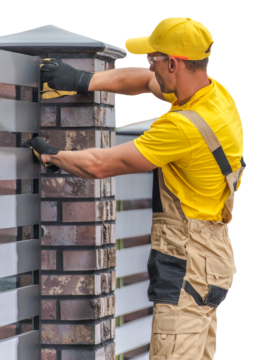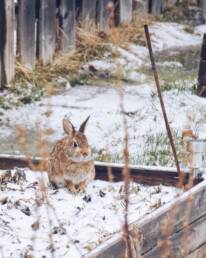At Denco Fence, we take immense pride in our commitment to providing top-notch fencing solutions tailored to the unique needs of Denver residents. With years of experience serving both residential and commercial clients in the Denver area, our team has garnered a reputation for excellence in fence installation, repair, and maintenance. Our dedication to quality craftsmanship and customer satisfaction has made us a trusted partner for all your fencing needs.
Denver’s Harsh Winter Climate
Denver’s winter climate can be quite challenging, with freezing temperatures and frequent snowfall. These conditions pose a significant threat to the longevity and structural integrity of your fence. As the city experiences temperature fluctuations, the expansion and contraction of materials can lead to cracks, warping, or even complete failure if not properly addressed.
Why Winterize Your Fence?
Winterizing your fence is not just a seasonal chore; it’s an investment in the long-term durability of your property. By taking proactive steps to protect your fence from the harsh Denver winter, you can prevent costly repairs and ensure that your fence continues to serve its purpose effectively. Whether your fence is made of wood, metal, vinyl, or PVC, our expert tips and guidance will help you navigate the unique challenges of winter in the Mile-High City.
At Denco Fence, we believe that a well-maintained fence not only enhances the beauty of your property but also offers peace of mind. So, let’s embark on this journey together and prepare your fence to withstand Denver’s winter with resilience and grace.
Understanding Denver’s Harsh Winter Climate
Denver, often referred to as the Mile-High City due to its elevation of 5,280 feet above sea level, boasts a stunning landscape and a vibrant cultural scene. However, its elevation also brings about some challenging winter conditions that can take a toll on your fence. In this section, we will delve deeper into what makes Denver’s winter climate unique and explore the potential impacts on your fence.
Cold Temperatures
Denver’s winters are characterized by frigid temperatures. From late November through early March, it’s not uncommon to see temperatures plummet well below freezing. These extended periods of cold can have several adverse effects on your fence:
- Material Contraction: The freezing temperatures cause the materials in your fence to contract. This can lead to issues like warping, cracking, and structural instability.
- Frost Heave: Denver’s freeze-thaw cycles are notorious for causing frost heave. When the ground freezes and thaws repeatedly, it can push fence posts out of alignment or even out of the ground, compromising your fence’s stability.
- Moisture Problems: Cold weather can exacerbate moisture-related issues. If there are any existing weaknesses in your fence, such as small cracks or gaps, moisture can infiltrate and freeze, causing these issues to worsen.
Frequent Snowfall
Denver is no stranger to snowfall, and during the winter months, the city sees its fair share of snow. Heavy snow accumulation can add significant weight to your fence, especially if it’s a wooden one. This additional weight can lead to leaning or even collapse in extreme cases.
Moreover, as snow melts and refreezes, it can introduce moisture into your fence materials, accelerating wear and tear. If not properly managed, this can result in rot or decay in wooden fences and rust in metal ones.
Intense Sunlight
Denver is known for its abundant sunshine, even during the winter months. While this can be a welcome sight on a chilly day, it can also pose a challenge for your fence. The intense UV rays combined with cold temperatures can cause materials like wood to dry out and become brittle, making them more susceptible to damage.
Sudden Weather Changes
Denver’s weather is known for its unpredictability. It’s not uncommon to experience rapid shifts from sunny and warm to cold and snowy in a matter of hours. These rapid fluctuations can put extra stress on your fence, as materials expand and contract quickly, potentially leading to cracks or structural issues.
In light of these unique winter conditions, it’s crucial to take proactive steps to protect your fence. In the following sections, we’ll discuss specific strategies for preparing your fence for the challenges posed by Denver’s harsh winter climate. By understanding the intricacies of Denver’s winter weather, you can better appreciate the importance of winterizing your fence to ensure its durability and longevity.
Preparing Your Fence for Winter
As Denver’s winter season approaches, taking proactive steps to prepare your fence is essential to ensure it remains sturdy and resilient throughout the cold months. In this section, we’ll outline the key steps you should follow to get your fence winter-ready.
Inspecting Your Fence
- Checking for Existing Damage or Weaknesses: Begin by thoroughly inspecting your fence for any pre-existing damage or weaknesses. Look for signs of rot, cracks, loose or missing fasteners, and leaning or unstable posts. Identifying these issues early allows you to address them before winter sets in.
- Identifying Areas Needing Repair or Replacement: Pay close attention to areas that may need repair or replacement. Wooden fences are particularly vulnerable to rot and decay, while metal fences may show signs of rust. Addressing these issues promptly is crucial to prevent further deterioration.
Cleaning Your Fence
- Removing Dirt, Debris, and Mold: Cleanliness is key to a healthy fence. Remove dirt, debris, and any mold or mildew that may have accumulated on the surface. Use a pressure washer or a scrub brush and a mild detergent to gently clean the fence. Avoid abrasive cleaners that could damage the finish.
- Applying a Gentle Cleaning Solution: When cleaning, opt for a gentle cleaning solution that won’t harm your fence material. For wooden fences, a mixture of water and mild soap works well. For metal and vinyl fences, a solution of water and white vinegar can effectively remove stains.
Applying a Protective Finish
- Choosing the Right Type of Sealant or Paint: Applying a protective finish is vital for safeguarding your fence against winter elements. Select the appropriate sealant or paint for your fence material. For wooden fences, a high-quality wood sealant or stain is ideal, while metal fences may benefit from rust-resistant paint. Vinyl fences typically do not require painting.
- Properly Applying the Finish: Follow the manufacturer’s instructions when applying the finish. Ensure that the surface is clean and dry before application. Apply the finish evenly and allow it to dry thoroughly. Multiple coats may be necessary for optimal protection.
By performing these preparatory steps, you’re taking the first critical measures in fortifying your fence against Denver’s challenging winter climate. In the upcoming sections, we’ll explore specific winterization techniques tailored to different fence materials, such as wooden, metal, and vinyl fences, to provide you with a comprehensive guide to winterizing your particular fence type effectively. Remember, a well-prepared fence is more likely to withstand the cold, snow, and moisture that Denver’s winters bring.
Protecting Wooden Fences
Wooden fences, while beautiful and classic, require special attention to protect them from the rigors of Denver’s winter.
Sealing and Staining
Importance of Sealing and Staining: Sealing and staining your wooden fence is crucial to shield it from moisture, which is one of the primary threats during winter. These treatments not only enhance the fence’s appearance but also create a protective barrier that prevents water from seeping into the wood.
How to Properly Seal and Stain a Wooden Fence
- Begin by cleaning the fence thoroughly as mentioned in the “Cleaning Your Fence” section.
- Allow the fence to dry completely before applying the sealant or stain.
- Use a high-quality wood sealant or stain that is specifically designed for exterior use.
- Apply the product evenly using a paintbrush, roller, or sprayer. Ensure complete coverage of all wood surfaces.
- Pay extra attention to the end grains and joints, as these areas are more vulnerable to moisture infiltration.
- Allow the sealant or stain to dry according to the manufacturer’s recommendations, typically at least 24 hours.
- Apply a second coat if recommended for added protection.
Replacing Damaged Wood
Identifying Rotted or Broken Wood: Winter can exacerbate existing weaknesses in wooden fences. Inspect your fence for rotted or broken wood components, such as boards, pickets, or posts.
Steps to Replace Damaged Wooden Components
- Carefully remove the damaged wood using a saw or pry bar.
- Measure and cut a replacement piece to match the size and style of the existing fence components.
- Secure the replacement piece in place using galvanized nails or screws.
- Sand the replacement piece and finish it to match the rest of the fence if necessary.
Winterizing Metal Fences
Metal fences, whether made of iron, steel, or aluminum, are known for their durability. However, they are not immune to the challenges posed by Denver’s winter.
Rust Prevention
- Cleaning Rust from Metal Surfaces: Inspect your metal fence for signs of rust. Use a wire brush or sandpaper to gently remove any existing rust. Wearing gloves and safety goggles is recommended when dealing with rust.
- Applying Rust-Resistant Paint or Coating: After removing rust, apply a rust-resistant paint or coating to the metal surfaces. This will act as a protective barrier against moisture and prevent further rust formation.
Lubricating Moving Parts
- Keeping Gates and Hinges Well-Lubricated: Metal fences often have moving parts such as gates and hinges. These can become stiff and prone to freezing during winter.
- Using the Right Lubricant for Cold Weather: Apply a lubricant specifically designed for cold weather conditions to prevent freezing. Silicone-based or lithium grease lubricants work well for metal components.
By following these comprehensive tips, you can protect your fence from the harsh Denver winter and ensure its durability for years to come. Remember that Denco Fence is here to help with all your fencing needs, from repairs to replacements. Don’t hesitate to reach out for expert assistance in preparing your fence for the winter season.

Need an expert opinion? Talk to our experts today!
When you talk to our experts at Denco Fence Company, we’ll help you compare fence styles, share design ideas, and answer any questions along the way. If you’re looking to build or repair a fence that you and your neighbors are going to love, get a free estimate and let us help bring your project to life.

